Posts by bclark
World Relief Memphis, Shelby County Mayor Lee Harris and Memphis Mayor Jim Strickland Host Press Conference on Creating a Community of Welcome for Afghan Allies and Parolees
September 9, 2021
CONTACT:
Lauren Carl
lauren.carl@pinkston.co
703-388-6734
MEMPHIS, TN – On Thursday, September 9, World Relief Memphis hosted a press conference with Memphis Mayor Strickland and Shelby County Mayor Harris, where they highlighted how the Memphis community can best prepare to receive Afghan allies and parolees in the coming weeks.
Since 2012, World Relief Memphis has served over 10,000 refugees and immigrants alongside the local church and their partners. As tens of thousands of Afghan refugees are fleeing violence, persecution and oppression following the Taliban takeover of Afghanistan, the Memphis community now has a unique opportunity to collaborate and welcome their newest neighbors from Afghanistan. A united community effort is needed to help ease the integration process and provide stability as new and aspiring Americans begin to rebuild their lives in the greater Memphis area.
Speakers included Lieutenant Colonel Kevin Rardin, Renewal Church pastor Chris Bennet and an Afghan refugee resettled in 2014 through a Special Immigrant Visa. The group addressed the need for a community wide effort to welcome our newest neighbors from Afghanistan, including the support of public, private and faith-based institutions and individuals in order to help meet resettlement expenses for newcomers in Shelby County and the City of Memphis.
PJ Moore, executive director of World Relief Memphis, commented:
“For 40 years, World Relief has sought to build welcoming communities by empowering the local church and our partners to serve people in vulnerable situations. Now, we have an opportunity to collaborate across the entire community to welcome our newest neighbors from Afghanistan. By coming together, we can help ease the integration process and provide stability as they begin to rebuild their lives here in the greater Memphis community.”
Jim Strickland, Memphis Mayor, commented:
“The greatness of any city is measured by its people,” said Mayor Jim Strickland. “I welcome our newest residents to Memphis knowing our city will be enriched by their experiences and diversity. In addition, these families are having to flee their home country because their lives were at risk for assisting American troops; therefore, we must offer a helping hand to those who offered us help.”
Lee Harris, Shelby County Mayor, commented:
“Shelby County stands ready to provide support and stability to those fleeing violence and oppression in Afghanistan. I believe this will honor their service alongside our county’s veterans who fought valiantly during the War in Afghanistan. We know that these refugees, like the ones who have come before them, will make enormous contributions to our community.”
Andesh Saifodeen, Special Immigrant Visa holder resettled in 2014, commented:
“I would like to recite to you a quote from the Holy Scripture that is close to my heart. God Almighty states, ‘Those days of hardship we rotate and alternate amongst mankind.’ We may be in a better place than others today, and they need our help. Who knows when we could be the ones in need. Lending a helping hand is not only the right and most ethical thing to do, but it is also a great investment for our unknown future. I want to thank everyone here for taking action and being a part of this initiative. We have always been a very diverse city in Memphis. Accepting refugees and helping in times of crisis has been a major part of that tradition. It has made a big difference in my life as well as in the lives of many people I know. That’s why I’m here today. To show that I value this work and the work of Word Relief Memphis as we continue on the tradition of welcoming and embracing diversity.”
Kevin Rardin, Lieutenant Colonel Rardin, US Army, Retired, and current assistant Shelby County public defender, commented:
“When I went to Afghanistan, I was a stranger in a strange land, but my interpreter and my colleagues in the Afghan Army welcomed me and showed me great kindness. My story is not unique, though. Many Afghans did the same for many Americans. Today, you and I here in Memphis have a chance to repay that kindness by welcoming our new neighbors to our city.”
Chris Bennet, lead pastor at Renewal Church, commented:
“When I heard that several Afghan families would be resettled here in Memphis because of the imminent danger they faced at home, I was eager to welcome and comfort them. These vulnerable people find themselves having to abruptly start over in a strange new land and all they bring with them are empty hands and broken hearts. I’m reminded of Jesus’s words in Matthew 25:35 which reveal his heart for the refugee: “I was a stranger and you welcomed me.” I am so thankful that we, the churches and residents of Memphis, have the privilege to show hospitality to Jesus by opening our hearts to our new friends and neighbors.”
About World Relief
World Relief is a global Christian humanitarian organization that brings sustainable solutions to the world’s greatest problems – disasters, extreme poverty, violence, oppression, and mass displacement. For over 75 years, we’ve partnered with churches and community leaders in the U.S. and abroad to bring hope, healing and transformation to the most vulnerable. Learn more at https://worldrelief.org/respondg.
###
Some Afghan refugees find relief in the Mid-South
MEMPHIS, Tenn. (WMC) – Memphis will soon see Afghan refugees who are getting help from the resettlement organization World Relief Memphis.
They are people who worked alongside the U. S. military in Afghanistan.
The images coming out of Afghanistan are heartbreaking. Desperate people are trying to get out of the country taken over by the Taliban. Some of those families and individuals will be heading to Memphis and welcomed by World Relief Memphis.
“Our office receives those families at the airport and helps them find housing, a job, English classes, and helps them in community connections around town,” said P.J. Moore, executive director of World Relief Memphis.
This story aired on WMC Channel 5 on August 20, 2021.
Some Afghan refugees headed to the Mid-South as evacuations continue
MEMPHIS, Tenn. — As Afghan refugees continue to flee their country following the Taliban’s takeover, U.S. military evacuations continue.
Refugees will settle in areas across the globe, and some are even coming to the Mid-South.
Of the thousands of families seeking a new life as they flee the chaos in Afghanistan, at least two are headed to Memphis.
This story was originally published on Fox13 News on August 24, 2021.
Memphis agency prepares to receive Afghan refugee families
A Memphis refugee resettlement agency is advocating for the city to take in more Afghan nationals who aided the U.S. government during its two-decades long war in the country.
At least two families are already expected to arrive here in the next few weeks, says PJ Moore, head of World Relief Memphis. The families are some of the thousands eligible for what are known as Special Immigrant Visas (SIV). Applying for one is reserved for Afghans who provided military or diplomatic missions with services such as translation, but it has historically been a drawn-out, bureaucratic undertaking, leaving thousands in vulnerable situations while they wait.
This story was published on August 19, 2021 for WKNO.
Freedom: why one Afghan woman left home
This summer, our interns attended an ethical storytelling workshop in partnership with the University of Mississippi and Southern Foodways Alliance. To learn the ropes of the industry, they were tasked with interviewing immigrants within their community. Our Employment Services intern, Emma Perry, spoke with Samira, an Afghan refugee who faced religious persecution and now serves as an ambassador to the local Afghan community. This is her story as told to Emma.
“I graduated from high school in Afghanistan, and I was looking for a scholarship to study in Afghanistan. But I was looking to go abroad to study because in Afghanistan it is not safe for girls to study, they do not have that freedom in Afghanistan. It is that if a boy wants to get married you do not need to go study, you get married. Because of this I wished to go abroad to study and further my education. And then I got a scholarship to study in Mongolia, and my university was in English. My English was very basic, and then I started a one-year English language course and then entered university, I did three years of my university in Mongolia. And then I went back to Afghanistan.”
“…During that time, when I was in Afghanistan, some sort of security issue happened. One day, nearby, there was a suicide attack that happened, and it became dangerous there for me because I found Christ in Mongolia. A non-profit organization helped me and sent me to India. I stayed in India for a few months before I got an invitation to return to Mongolia. I finished my senior year, and they offered me a job in the admissions office. After that, it was not safe for me to go back to Afghanistan, so I opened a refugee case in Mongolia, and I got invited to the United States. I arrived in 2017, I went to Colorado Springs, but God had a different plan for me, and I came to Memphis. We moved to Memphis and then after a year my husband came from Australia. We have been here for three years now. My husband and I both have it in our hearts to reach out and help refugees.”
“My first degree was business management, but since I came to the United States I could not find a job with that because the degree was not the same as it is in America. So, I changed my major here, to social work, and I just graduated. Now I have a baby girl and I stay here at home with her. I would like to get an MSW [masters of social work] so that I may help refugees like me, just as World Relief helps them.”
Samira, we are so glad to have you as part of our community, and our prayers are with you, your family, and your country. If you want to make a difference by helping those fleeing Afghanistan or persecution elsewhere, come join us this fall.
If you’re unable to volunteer at this time, please join us in praying for those impacted by the events of this weekend. You can text “Prayer” to 901-617-4411 to get started.
A Father’s Wish
For privacy, the program participant’s name has been abbreviated.
When A left Rwanda five years ago, she left behind not only her home but also her father. She, her mother, brother and sister had completed the long process of applying for refugee resettlement, but her father had not. She was being offered a chance at a new beginning, and her father would not be coming with her.
When she arrived in the U.S., she was plagued with doubts. The language was difficult, school was different and people were unwelcoming. Yet despite the adversity that she faced, A remembered why her family had decided to leave her home and father.
“When I first left Africa, my dad told me that the main reason we came here was to have education,” said A, now 19. “Because of that, I will work so hard so that I can get a scholarship to go even higher, not just to high school, because in my family, I’m going to be the first one to go to university.”
New Beginnings
So at the age of fourteen, A arrived in her new home, determined to make the most of it. Her family had been vastly shaken; her sister was pregnant with twins, and her husband had also been left behind.
School was a refuge, but it was also filled with bullies.
“Some of the [students] were really smart, and they motivated me to keep going—even the bullies at my school because I didn’t want to become what they were calling me,” A explained. “Some of them would say ‘Go back to Africa. You’re not going to achieve anything here.’”
Rather than being deterred, however, A used the words of her father and those of her adversaries as motivation: “I was like ‘I’m not going to become what they are calling me. I’m going to keep going.’”
Over the next four years, A pushed herself to learn English, to study hard and to take advantage of the opportunities presented to her. Even though school was very different—she no longer had to walk there every day, and she no longer risked receiving a “whooping” for being late—it was her chance to start over.
“It’s just that we didn’t have a lot of opportunities [in Africa], but here students have a lot of opportunities,” said the recent Sheffield High graduate. “It’s just that some of them don’t care. Some of them don’t want to use them. That’s what makes it different.”
Seizing opportunities
Yet with the help of World Relief Memphis and her friends and family, A seized the opportunities in front of her. She studied hard, making good grades despite the temptation to stray like some of her fellow students.
“I didn’t want to fit in, I didn’t want to do what they were doing because it would have affected my grades,” said A, the youngest of three. “So, I was just me.”
As graduation approached, she had the grades to receive a scholarship to go to university, but she didn’t know how to do so. When she learned about WRM’s youth mentoring program, she decided to participate.
“I didn’t have someone to talk about my financial aid, to choose the right school, and the right classes,” she said.
With the help of her mentor Mary, A began to see that her fears of failure shouldn’t stop her, that college was in fact a possibility.
A wish fulfilled
Thanks to her support system, A will now be attending Oakwood University in the fall as an applied mathematics and engineering major. When she told her father, who is still in Rwanda, he was very happy. As for herself, she’s proud to have graduated with a good GPA that allowed her to attend university.
Her World Relief mentor will still be in Memphis, but she plans to keep in touch and return home for the holidays. Her next goal is to prepare for college and eventually her career as an engineer, but before that, she has another one to accomplish.
“I’ve decided to follow Jesus so I’m going to prepare myself for eternal life,” A said, who grew up in the church and is an active member of the choir. “Also, keep choosing friends that can help me with that. That’s my goal.”
Knowing that, she hopes to one day be a mentor herself: “When you decide to walk with Jesus, that is something you have to do . . . I want to help people to build their relationship with God.”
Already, she has begun to think of how her own experiences could allow her to help others one day. To other students coming from Africa and situations similar to hers, her advice would be to persevere.
“I would say to the students that are coming from Africa, even the students [already] here—just keep going. You don’t have to figure everything out right away,” A encouraged. “Just be yourself and do the things that you left home to do. It’ll be hard here, but ask for help when it’s needed.”
A, we are so proud of you and your accomplishments, and we wish you the best of luck as you begin your college career! Thank you for sharing your story with us.
If you want to play a role in the lives of our youth like Mary did for A, come join us as a youth mentor.
As Told To: Isabel’s Story of Dreams and Aspirations
This summer, our interns attended an ethical storytelling workshop in partnership with the University of Mississippi and Southern Foodways Alliance. To learn the ropes of the industry, they were tasked with interviewing immigrants within their community. Integration services intern Gabriella spoke with Isabel, who participates in our Youth Mentoring Program.
Early one sunny Saturday, Isabel Lara Tenia and I met at a local coffee shop. Isabel told me about her aspirations and plans for the coming years as I sipped on my tea. As a rising senior, Isabel explained her dreams about college with excitement and nervousness. We also touched on World Relief Memphis, the organization that introduced Isabel and I, and how it has impacted her. The following quotations are excerpts pulled from my interview with Isabel, who so gracefully shared her story with me.
Isabel Lara Tenia’s Story
I grew up with both of my parents. I have two younger sisters. I’m the oldest one. We have always been together, playing, going on family vacations, throwing parties with all of our family members back in my country, and we are just always together enjoying ourselves.
We’ve been here for four years. When we first came here, I was really excited. I was just seeing and experiencing new things. We had been here several times before because my aunt has been living here for 25 years.
I am applying for universities and colleges right now, mostly abroad; but I’m also applying for the University of Memphis. I just love to discover new things. I like to meet people. I like to learn about different cultures. It’s just that, I want to explore. I want to just take advantage of being young and having the opportunity to do it.
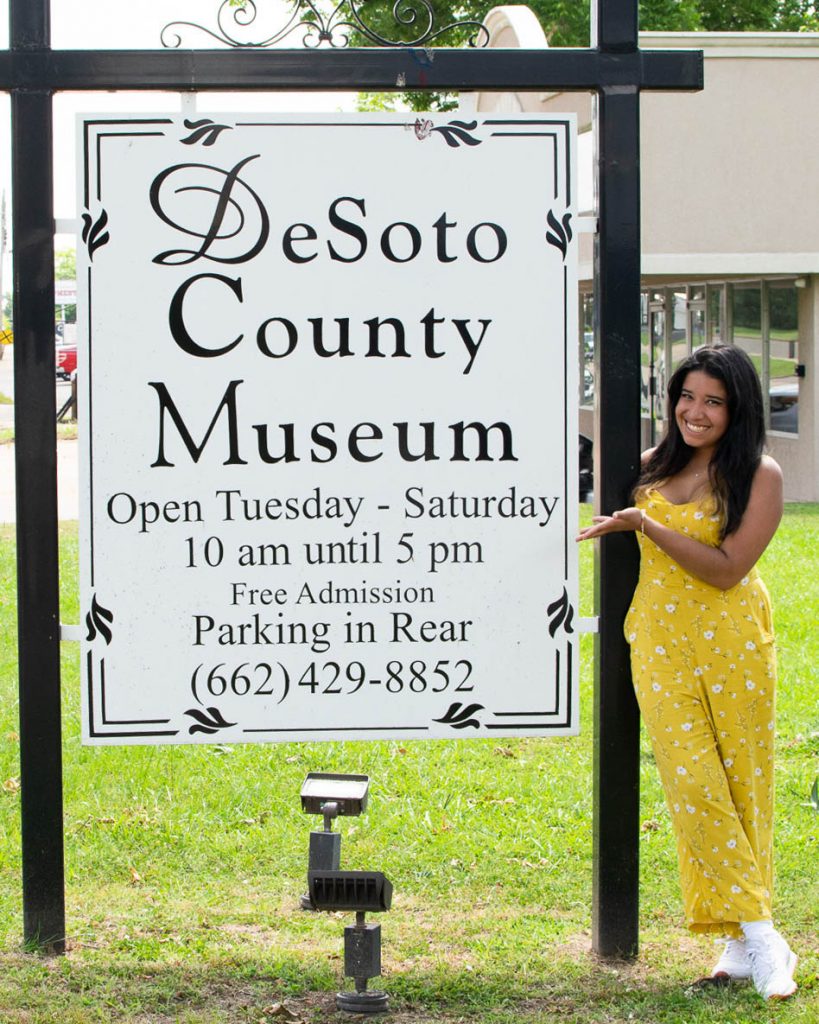
I am applying for some schools in Germany and also Japan, and I am looking at some schools in Australia. My great grandfather was from Germany so we have family there. I also have family members in Australia. There is also a lot of diversity at the University of Memphis which is what I like because, you know, I don’t want to just see the same people every day.
I want to go into biology and, hopefully, branch into genetics. I’m really fascinated by the human body and what we can do with it. Like genetics, you can just see what we’re made out of and that’s just fascinating to me. I want to work in a lab and wear a white coat. I’ve always wanted to do science.
The college experience is very different here than in Venezuela. I used to live in a city so there were a bunch of colleges there. No one really talks about dorms because there are no dorms. People really don’t move out that much after high school. We are still with our parents, and we just go to college there. It’s just all in one city.
When I came here and they were talking to me about colleges, I was like ‘oh my gosh why are they so far?’ That experience is a lot different from Venezuela because you’re closer to people, and all of your friends are from one area so you can always be with them and hangout with them. But, when you go to Memphis University or others, you have people from Michigan and Pennsylvania and stuff like that.
I really like the Youth Mentoring Program. It just started and we are now going to do the in-person stuff, which I am excited about because I feel like it’s just going to be better for all of us. I really like to listen to other people’s experiences and what they do because it really helps me to visualize how it’s going to be. How college and working is going to be. It makes me feel safer, I guess, because it’s clearer.
Isabel, we hope you enjoy your senior year! If you want to get involved in the lives of our youth, fill out an application to be a Youth Mentor today!
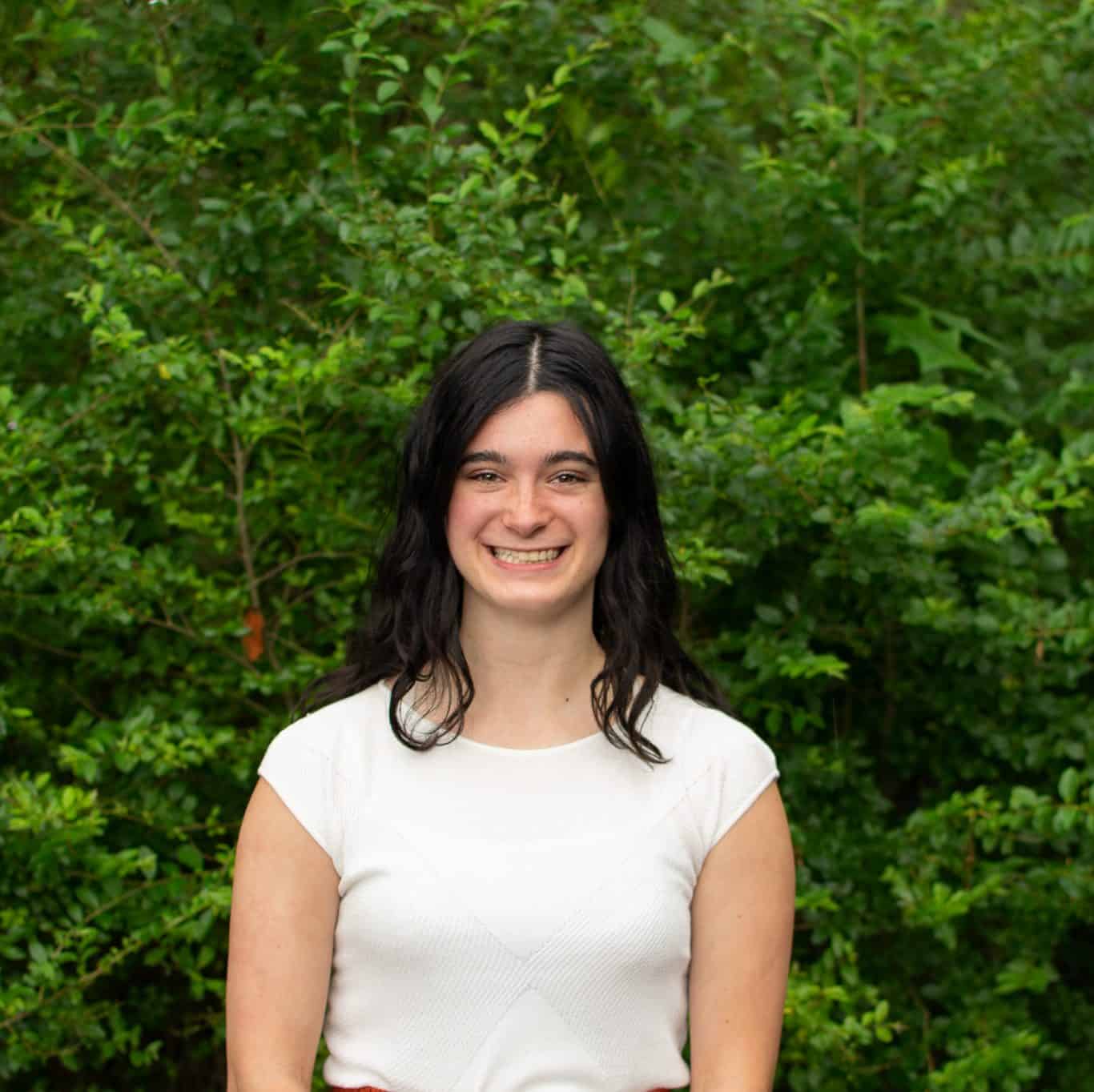
Gabriella Massey is a junior at Belmont University studying Spanish and Religion. She is passionate about the work she does with World Relief because she believes that everyone’s voice is important and she cherishes the opportunity to help others feel welcome and comfortable.
Trading citizenships: Why I decided to become an American
Throughout July, we’ve been focusing on citizenship and what it means to our friends in the immigrant community about what it means to them to be an American. As we close out the month, we wanted to share one last story with you from our operations manager, Bishnu, who is originally from Nepal.
As Nepalis
I came to the United States in 2005 for the first time. It was just a two-week visit for a conference in Arizona. I visited a few more times until we moved to the US permanently as a family in 2011 through the Diversity Visa Program, also known as the green card lottery.
The primary reason for our move to the US was our children’s schooling and better educational opportunities for them.
However, it was quite a dilemma for me and my wife to become US citizens since Nepal has no dual citizenship policy. It was a big decision for us. It took us a couple of months to finally decide to apply for citizenship. We realized we needed to go for it if our children wanted to become American citizens and stay here in the US.
Soon after, we submitted our application for naturalization and had our fingerprints taken. This process took us around 12 months. We all started preparing for the interview, which requires you to understand and answer any of 100 questions. It was a great opportunity to understand the US Constitution, the history and the responsibility of being a US citizen. Finally, we passed the interview without any problems.
We felt so proud to be citizens of the United States, taking our oath surrounded by people from 18 different countries from around the world. Once you become an American citizen, you have to report to the Nepali government and give up your passport if it hasn’t expired yet, therefore giving up our Nepali citizenship, but we felt that the benefits of being American citizens were worth it.
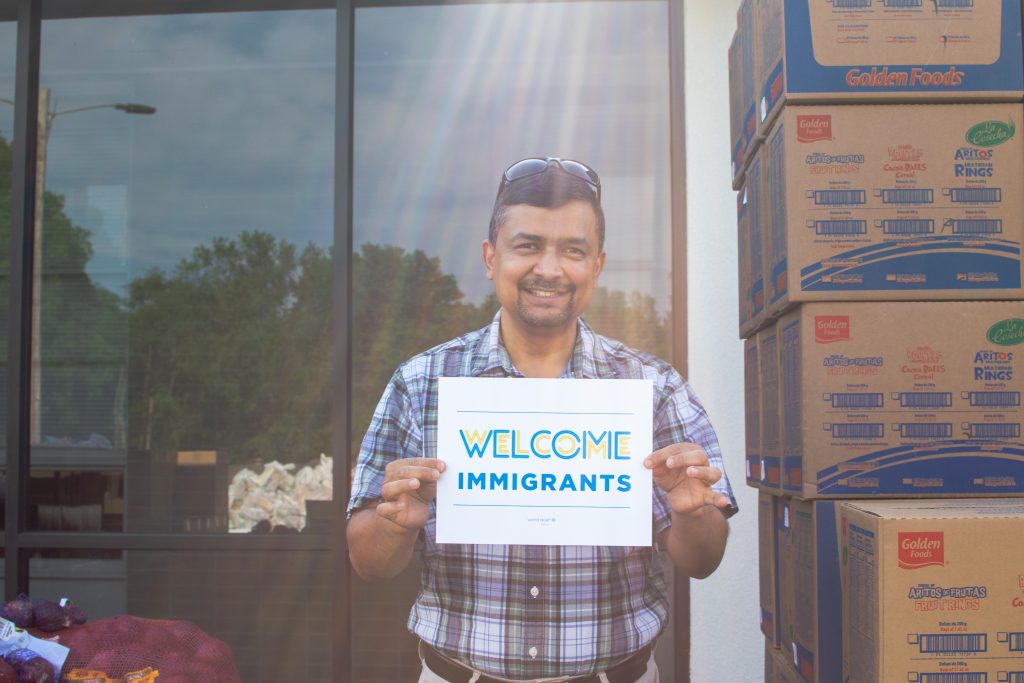
As Americans
First, our children have better educational opportunities, especially when applying for various college scholarships. Both of my children got full tuition scholarships. They are now about to finish college with no debt. It is a great blessing for us!
Second, one of my children desires to work with the federal government, which requires US citizenship.
Third, we had a hard time getting visas to visit many countries with our Nepali passports. Now, we can easily get visas, mostly on arrival, to those counties. It has given us the privilege to go anywhere in the world.
In fact, it was a strange experience when I traveled to Nepal with my US passport. I felt like a foreigner as I was told to stand in the line with other non-Nepali people and had to get a visa before entering the country. They granted me just a one-month visa in my first trip to Nepal as an American.
Before, we had always felt like second class citizens when we were living with permanent resident status in the US, but now we feel equal to all Americans. We were able to vote and elect the President and lawmakers of the country. It gives us great dignity and pride to be citizens of this great country!
Bishnu, thank you for sharing your story with us! It is a pleasure to work alongside you and to have you as a fellow American. If you want to help other immigrants on their road to American citizenship, join us as a volunteer.
Never too late: father of eight is reunited with his children at last
Six years ago, David Kenene was welcomed to the U.S. by World Relief Memphis. His eight children, however, had been left behind during the immigration process. After years of waiting, he was finally able to reunite with them this month. This is his story, as told to our summer intern Cierra Hunter.
I am Ugandan. I came to Memphis as a refugee. World Relief, they helped me a lot. I remember they took me to Christ Community; I went with Brother Andrew [a World Relief staff member]. When I reached Christ Community [a not-for-profit community health center] I was thinking about my family, the way I had left them and thinking about how they are doing now.
The next day we went to the World Relief office. It was my first time there. They asked, “Do you have family?” I told them yes, I have family. My problem is that I have 8 children. When I was doing my interviews with UNHCR in Nairobi I listed only 4 children when I have 8. I was told by a friend over there, “Never say that you have many kids because they don’t want people who have many kids. You will never be resettled; you will have to stay here.” That’s why I listed only 4 kids.
I didn’t eat those days because I was thinking about my family.
When I was at World Relief, I explained to them what was going on.
Katie said, “It’s okay, David. Can we pray?”
I said, “Yes, we can pray.”
Katie introduced me to Catherine, my caseworker, and Courtney, who told me, “We are going to work on this issue.”
I told them their names and how old they are. They told me, “Okay, we are going to work on it.” I was given hope that they were going to work on my concern so then I started working on what they asked me to do.
I thank God and I thank those people. They did a good job, they did a good job, they did a good job.
When asked about his hopes for his kids as they are reunited David shared: I want them to continue school.
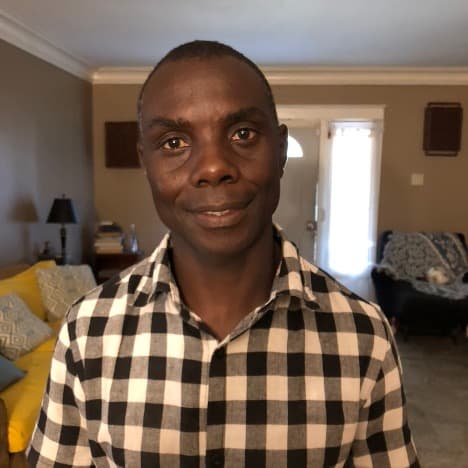
David Kenene recently bought a larger home in anticipation of his family’s arrival. 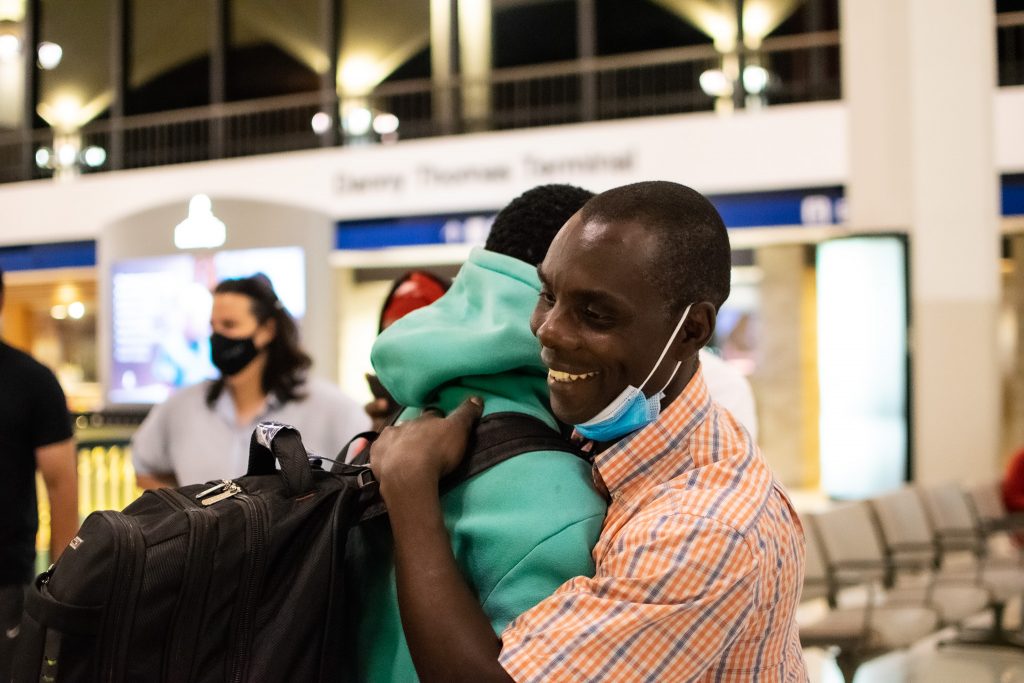
David Kinene embraces one of his younger sons after six years apart. 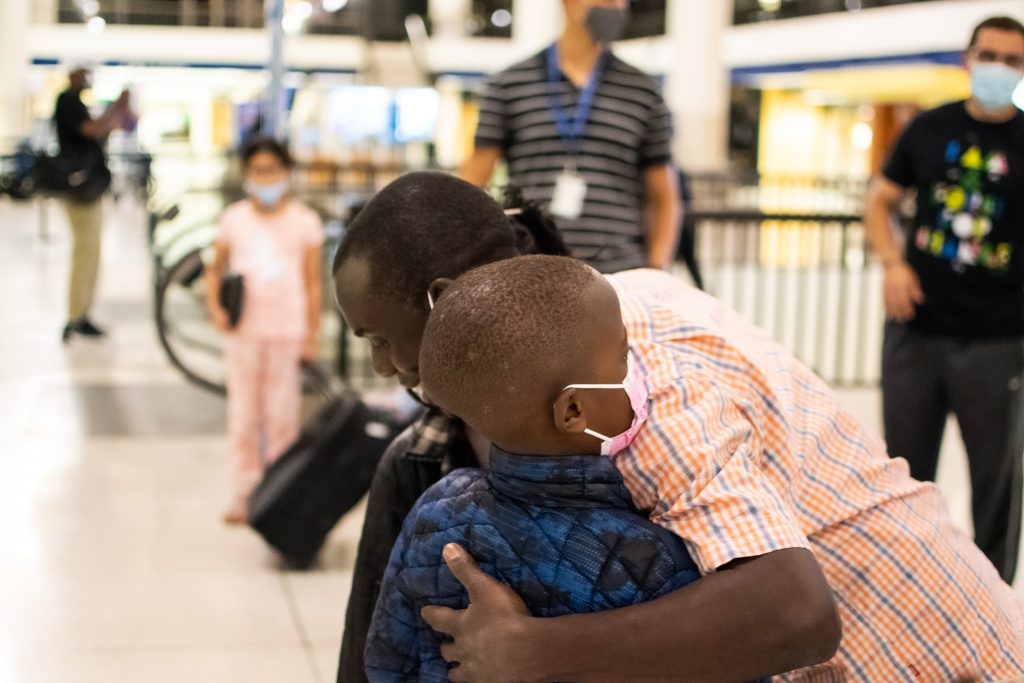
David Kenene hugs his two youngest children as they are reunited at the airport. 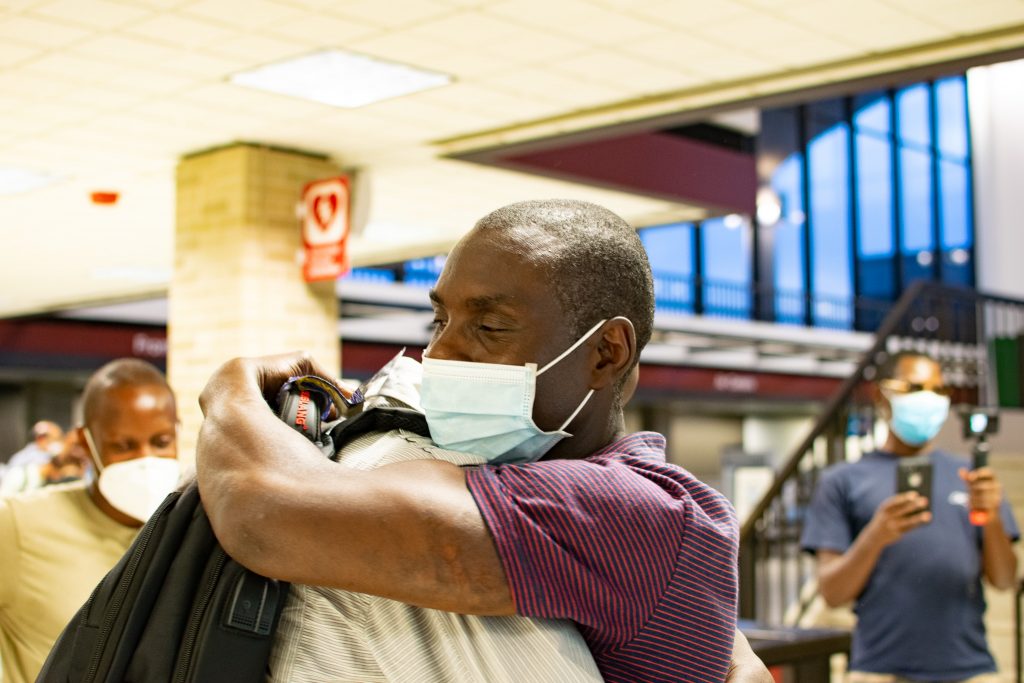
David Kenene greeting one of his sons, 18, the day they were reunited in Memphis. 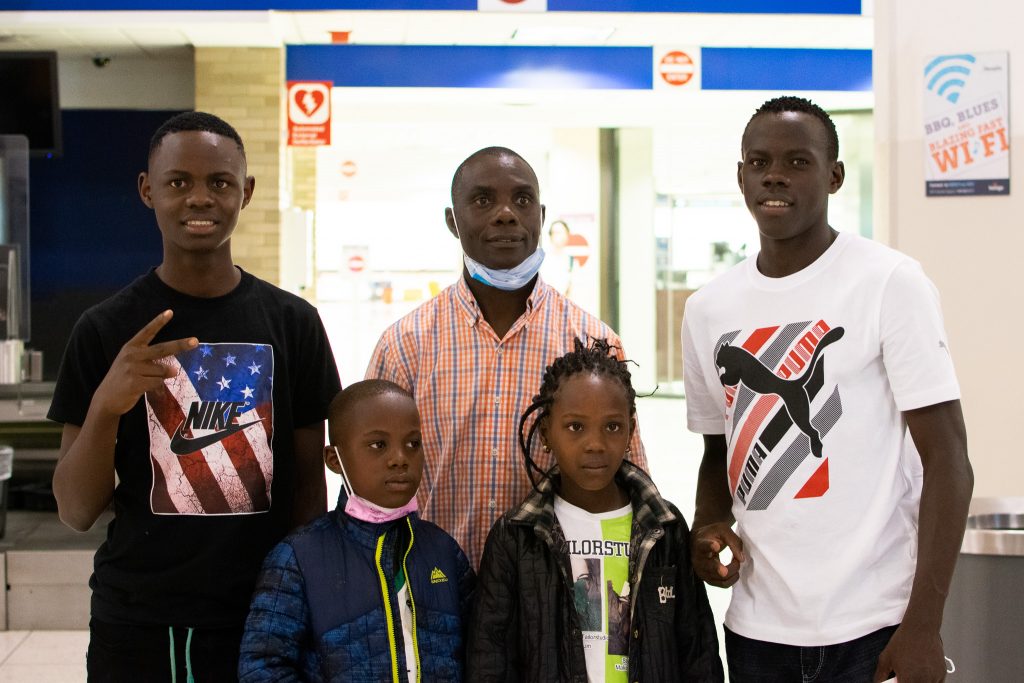
Four of David’s eight children arrived in the U.S. within one month of each other.
Facing big dreams: American citizenship makes them reality
This summer, our interns attended an ethical storytelling workshop in partnership with the University of Mississippi and Southern Foodways Alliance. To learn the ropes of the industry, they were tasked with interviewing immigrants within their community. Mobilization intern Peace spoke with Chisom about what being an American would mean to her.
A new normal
Growing up in Lagos, Nigeria, Chisom dreamt of leaving her home to go study abroad anywhere in the world, including the United States. “It was never a realistic dream,” She explained. “It was just something my parents mentioned a few times but was never something that was definite.” On March 30, 2017, Chisom and her family relocated to the United States, making her dreams come true right before her eyes.
She recounted the details of her journey to the U.S. with many emotions and smiles, even if the journey wasn’t a smooth one.
“It was a terrible experience because we were scared. At the place where they check your bags for contraband, the family in front of us, they checked their bags, and I don’t know what they found,” said Chisom, who is now 17 years old. “I don’t remember the situation at all, but they got deported back to the country—all five or six of them. They had huge bags, and we had a lot of stuff. It wasn’t a nice sight, honestly.”
Chisom eventually found a rhythm as her life found its new normal. She started high school and started to get accustomed to their curriculum, but her new normal was not without a few culture shocks.
“There are so many differences that I could write a whole book. Free public-school education was a huge difference. Even back in my country, they may have had ‘free’ public school education, but it wasn’t,” she said. “Here [in the U.S.], we have free public-school education where you’re given a free Chromebook to use throughout the school year, and you are given textbooks to use, and all you need to do is check it out. You don’t have to pay any amounts except if you lose it.”
On top of the differences in schooling, she also had to adjust to new standards of living.
“Anytime I think about it, I would always ask myself ‘How did I do this?’ There was never constant electricity back home. I feel it is all about adaptation because we were born into it,” Chisom explained.
The American dream
When asked about the reasoning behind her parents’ decision to migrate to the United States, she stated that it was simply the American dream.
“The American dream is what sold them, that when you come to America, you have a better life, and you have more opportunities for a better life, you get to explore more aspects of your life,” she said. “I think that is what pushed them to bring I and my sister to this country: to have opportunities that they didn’t have.”
In February 2020, Chisom found her life taking a turn for good when she got her legal permanent resident status, which meant that she was officially a green card holder and could apply for citizenship in the near future.
After stating that she is very happy about the turn of events in her life, she began to explain what a U.S. citizenship meant to her.
“America is known as the land of the free and the land of opportunities. Being a citizen means that I will be given the freedom to explore and utilize these many opportunities. I have been able to apply for scholarships that are only given to U.S. citizens, even as a legal permanent resident.”
Chisom, 18
One of those newfound freedoms would be helping to make decisions for her new country: “I think being a U.S. citizen entails knowing the constitution, knowing the privileges you have when you become a citizen, like voting. So, that would mean that I would partake in huge decisions of choosing leaders for my community, my state, or even in the country at large.”
She also spoke about the benefits of being able to travel to places like Austria, Qatar, Ukraine, and countries that don’t require a visa when you have your U.S. passport.
“This opportunity will help me explore many places while expanding my knowledge on how the healthcare system works in various places, preparing me for my career as a doctor,” she says.
Turning dreams into reality
Like many immigrant children, Chisom is not afraid to face her big dreams. She has dreamt of being a doctor since she was little and cannot see herself doing anything else.
Chisom graduated from high school in May and will be continuing her education at the University of North Georgia in the fall as she works towards her goal. She stated that the opportunities that a U.S. citizenship offers will help her achieve her dream of helping underserved communities and, hopefully, to help better the healthcare system of her homeland, Nigeria.
“Being a U.S. citizen is definitely going to help me achieve that. If I decide to build a hospital, I am pretty sure there’s paperwork and things that require my citizenship—maybe to have land rights and other things,” Chisom said.
The conditions of the healthcare system of Nigeria continue to be the driving force of her motivation to become a doctor. “I saw a video of them giving the COVID-19 vaccine, and the environment was not good at all. I almost cried,” she said.
Even without COVID, other problems still exist within their healthcare system such as self-diagnosis. “You feel weak, and all of a sudden it’s ‘malaria.’ You start taking malaria drugs every day, but it never occurs to them that they might have some other underlying problems,” she explained. “That is the sad reality.”
While Chisom continues to worry for her home country, she believes that her dreams can be achieved when she becomes a U.S. citizen, and she is grateful for the opportunity.
Peace joined the Mobilization Department as an intern in Spring 2021. She’s currently a sophomore at Rhodes University studying biology.








